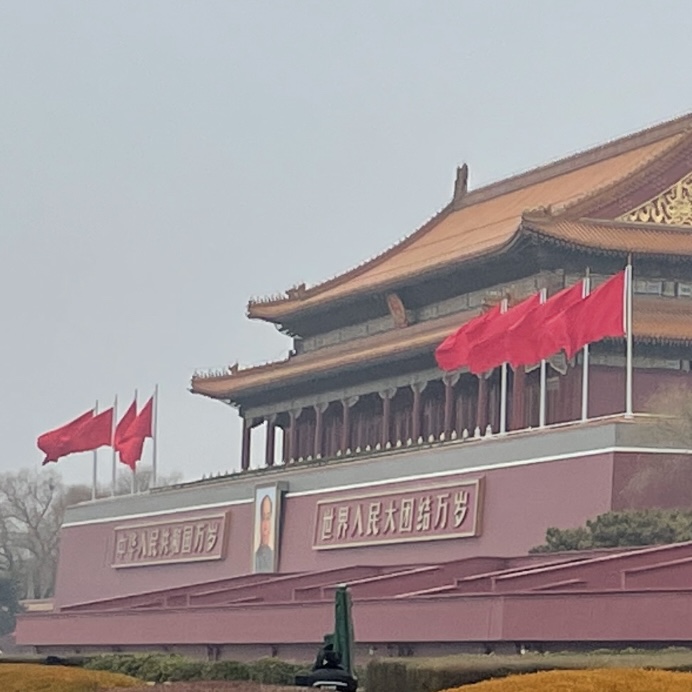- 14 Posts
- 29 Comments

 7·7 months ago
7·7 months agoThanks for that

 3·8 months ago
3·8 months agoOrientalism definitely plays a role

 10·8 months ago
10·8 months agoAgreed, no system, group, or party is infallible. There are many genuine critiques that can and should be made.

 9·8 months ago
9·8 months agoArchived link/paywall bypass: https://archive.is/VbSPI
Also, you would think a region once plagued by unrest and terrorism (fomented by our favorite imperialist power of course), now stable and prospering would be cause for celebration? No? Also about NEV subsidies, isn’t this what all countries should be doing? Besides, the Global North has long subsidized industries when they chose to.

 30·8 months ago
30·8 months agoRelated, China has become the number one scientific destination with the largest inflow of researchers outstripping the US, according to OECD data as reported (archive) by Science Business. I can’t cite the OECD data since it seems to be behind a paywall, but I believe you can find it here.
China also leads the world with nearly half of all applications for international patents (46.8%), trademarks (48.3%), and industrial designs (53.8%).
Japan’s science and technology ministry also conducted a study, as reported (archive) by Nikkei Asia, and found China leads the world in research papers. Both in quantity and quality.
A report by Clarivate substantiates this. This report also describes how China is not reliant with collaboration with the Global North for research, and that China is expanding research with Global South countries.
Despite all this, in the imperial core they still believe China can’t innovate. All while China is out-innovating the Global North.

 26·8 months ago
26·8 months agoI can confirm Lemmygrad is accessible. Hexbear is, but loads VERY slowly in my experience. No such issue for Lemmygrad.
By the way, the firewall varies slightly in different provinces. That being said Lemmygrad seems accessible everywhere.
ps: most sites are accessible. Only big American tech sites that don’t want to follow local law (Google, Facebook, etc.) are blocked. Many other websites are not blocked but just load really slowly. Not certain why, part of it may be the websites throttling IP address from China.
The recently I talked to a Chinese banker in one of the biggest Chinese banks. We where walking around a beautiful park, which also had a public library in it overlooking the park. A very nice public space overall. Anyway, in the library there was a stack of The Governance of China (third volume) by Xi Jinping on one table. So we talked about it, and it turns out the bankers in China read this book, have classes/study sessions, and try to find ways to implement Xi Jinping thought. Imagine calling a country capitalist when bankers read communist theory and have study sessions for it. That’s China; not a capitalist country, but a socialist country where the party is doing it’s best to develop material conditions, and they have largely been successful.

 11·1 year ago
11·1 year agoEven today you can visit mosques with more than a thousand year of history in Chinese cities. They have a unique style, and are beautiful. The link in the article shows some historical examples of images. You could also tale the Xi’an great mosque as an example. It retains a historical design with both Chinese influences, and Islamic aspects. Minarets for example may look more like pagodas. This is not “tearing down Islam”, but is in fact the hisotry and tradition of Islam in China. As a matter of fact, China is one of the countries with the longest hisotry of Islam.

 18·1 year ago
18·1 year agoBesides what others have said, this expat.clearly has a. no more nuanced understanding than your average western armchair expert.
The point that China only cares about GDP growth is false and misinformed. China, in particular with Xi, has made a large shift to quality development. If you follow China this is clear as the official position and policy goal. This includes green development. In doing so they have thus far been quite successful.
All thr points on real estate are superficial conjecture on a complex issue. Just consider that GDP is effectively a mesure of transactions/investments/consumption. High GDP in the US coming from healthcare prices being inflated does not translate to growth or development. Likewise, a hot real estate market might be good for GDP, but it does not necessarily translate to development. We should recognize this, as does the Chinese government.
Not to say real estate in China is irrelevant, land sales is a major source of funds for local government. It has importamce and implications, none of which where reflected upon in the comment you quoted.
It just means we’ll see years, perhaps decades, of negative growth in China, increasingly authoritative measures taken by the government, more protests, more suppressed protests, more people with opinions disappearing, more brain drain, more kindergarten stabbings, more music with revolutionary themes removed. Year by year, things will be a little worse off than the year before. More people will give up and lie flat. The only movies in the cinemas will be about the Korean War, and the only things on TV will be anti-Japanese shows or wuxia palace dramas.
All of this is false and misleading. I cant go point by point, dont have the time. Just consider it is the US and EU with negative growth. (western) International organizations and financial companies project solid growth in China. There is increasing diversity and quality in Chinese cinema, even socially critical movies. There was one commenting on the challenges of rasing a kid these days, touching on house prices, education, and more. I could go on.
I would cite sources, but most of this is easy to find. If you are reading this I encourage you to read more about China.
What is the general area/field your diploma is in? I dont think thr Chinese government will let arbitrary people into China to set up a commune… However, you could consider continuing your education in China (presumably a master if you have a bachelor?). China has scholarship schemes that you can look into. Many have full tuition plus living stipend. Then, you will improve your skills and enable yourself to stay more easily subsequent to your studies, if you so chose.

 2·1 year ago
2·1 year agoWell, to be fair I didn’t add the link to the article by accident, so it is a bit confusing…
https://www.salon.com/2017/10/08/womens-labor-sex-work-and-u-s-military-bases-abroad/

 5·1 year ago
5·1 year agoSorry, I forgot to add the link to the article hahaha
https://www.salon.com/2017/10/08/womens-labor-sex-work-and-u-s-military-bases-abroad/

 14·1 year ago
14·1 year agoWords lose meaning and become fickle dog whistles for narrative political correctness with liberals. Is it against our narrative? It is a propaganda mouthpiece. Free press is only for unsalted crackers, apparently; even though it isn’t free.
That asside, GT has some good journalism and takes on current events; exactly why it is being discredited. A real history and understanding of GT would be genuinely worthwhile.
I can appreciate analog and/or specialized tools. I think typewriters, film cameras, watches, etc. are all fascinating. I might enjoy engaging with them. However, a low end Android is cheaper more accessible to most, assuming limited finances and/or no inheritance of such items. ‘Everything machines’ can be a boon for those individuals by means of concentrating utility and reducing cost. Evidently, capitalism nonetheless creates issues with this, as others have correctly discussed.
I would say that in China, one uses smartphones for neerly everything, even more so than in the global north. This is for various reasons, but it does have practically since all you ever need will be in your phone, including wallet and keys. This does make the development of HarmonyOS by Huawei very interesting. It may abate some of the current issues, especially given that I believe the OS is open source.

 22·1 year ago
22·1 year agoThat would help the economic situation in the imperial core… At least for the bourgeoisie.
Small aside, China has an extensive regular speed train network. Trains are still rather fast, but obviously slower than HSR. It is very beneficial to have both, as the slower trains are quite a bit cheaper. China has a large population, and many people take the regular train, even with standing tickets. These trains move a lot of people and are an important part of the transit system. Sometimes it feels like an inter-city metro since you can take trains at any time to any city.
As others have said, France became a liberal dictatorship of the bourgeoisie, while the Bolsheviks created a workers state.
Keep in mind, if you look into french history, the more radical elements are denounced. For instance, decrying purges done by the Jacobins, while the monarchy slaughtered many more. French schools actually condem many aspects of the revolution, even though the system is content with the end result.
Another point: guillotines where actually conceived as a humaine alternative to hangings. You don’t feel much when decapitated in a fraction of a second, even if the end result is macabre. On the other hand, if you are shot, hopefully a bullet finds its way somewhere that will end you quickly. Either way, good riddance to the monarchs; both dynasties oppersed their people and perpetuated systemic harm.

 6·1 year ago
6·1 year agoIt betrays some deep sated hostility and vehement hatred to the global south. The mentality of colonialism never truly went away, it just evolved.






Not just infrastructure, payments are also convenient with Ali pay/WeChat pay. Everyone pays everything by phone, most haven’t used cash or card in years, although you can if you want. Apps are also ridiculously well designed and integrated, less visible as a foreigner, as much if it is obviously in Chinese and you have a language barrier. But you can really do anything you can imagine in WeChat. Alipay can also translate in miniapps. Say you are in a restaurant, you will scan a qr code on the table, can have a menu that you can automatically translate if you so chose. You also can order and pay through that menu on your phone.
Bureaucracy exists like everywhere else, but tends to be faster and more efficient in my experience. It’s not perfect, but the country does feel very different.
Also, it doesn’t depend that much on the city. I have been to most large cities in China, many small and medium sized ones too. I have also been to the countryside. The latter is more relaxed, but everywhere has technology and infrastructure. Basically all cities are serviced by train. Towns will all have bus systems that mean you can get anywhere in the country with public transportation.